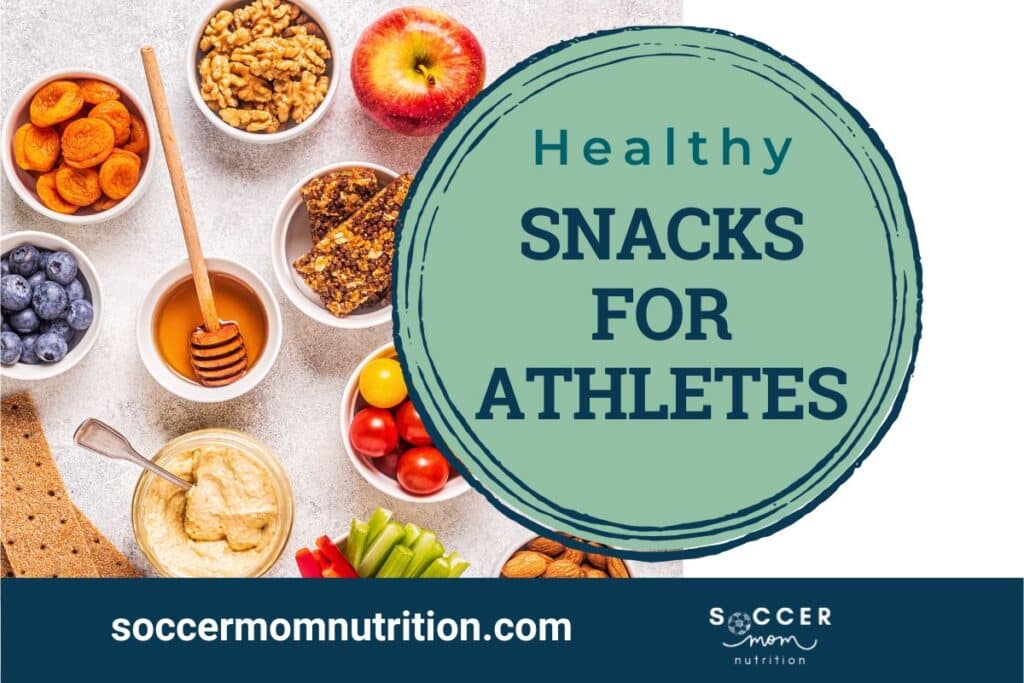25 Healthy Snacks for Athletes to Optimize Fueling
Fueling your body for optimal athletic performance involves incorporating healthy snacks into your sports nutrition plan. These healthy snacks for athletes are essential to help you meet your daily sports nutrition energy goals.
Healthy snacking is are essential for meeting your body’s energy and nutrient needs, boosting your overall energy and keeping you from feeling too hungry between meals or before or after games.
But what makes a snack healthy and helpful? When should you eat them? And why are they so important for your performance and well-being?
Let’s explore these questions and more, while we share our top snacks. These 25 healthy snack ideas will keep you energized, satisfied and ready for any challenge.

Please note that this article contains affiliate links. If you click one of these links and make a purchase, we may earn a commission. As an Amazon Associate, we earn from qualifying purchases.
Our favorite 25 healthy snacks for athletes
Our favorite healthy snacks for athletes combine carbohydrates and protein for more substantial mini-meals.
- Greek yogurt with mixed berries and granola
- Peanut butter and jelly sandwich on whole wheat bread
- Fruit smoothies with your favorite fruits and Greek yogurt
- Turkey and cheese wrap with whole wheat tortilla
- Hummus with whole grain pita chips
- Whole grain cereal with high-protein milk
- Cottage cheese with pineapple and a sprinkle of chia seeds
- Trail mix with nuts and dried fruit
- Protein bars with a mix of nuts and seeds
- Overnight oats with almond butter and sliced bananas
- Sliced apples or bananas with peanut butter
- Whole wheat bread or bagel sandwich with turkey, cheese, or hummus
- Hard-boiled eggs for a quick protein boost
- Cheese sticks with whole grain crackers
- Low-fat milk or chocolate milk for hydration and recovery
- Tuna or salmon packets for protein on the go
- Almonds or mixed nuts for a satisfying crunch
- Beef jerky for a portable protein source
- Carrot sticks with almond butter for a balanced snack
- Rice cakes with cottage cheese and sliced strawberries
- Greek yogurt with honey and crushed walnuts
- Banana with almond butter and a sprinkle of cinnamon
- Protein powder mixed with milk or water for a quick shake
- Sliced cucumbers with hummus for a refreshing combo
- Whole grain crackers with a side of guacamole
Why do athletes need snacks?
Athletes need healthy snacks because a well-planned snack can prevent excessive hunger, top off fuel stores and make sure athletes eat enough food to meet their energy needs.
By maintaining steady energy levels, healthy snacking helps athletes kickstart their games or practices with a well-fueled body.
Additionally, snacking smartly regulates blood sugar levels, preventing those irritable and ravenous crashes that can occur when hunger is ignored.
For those athletes who tend to skip meals, especially breakfast, incorporating healthy snacks becomes even more crucial to ensure you meet your calorie needs.
Choosing snacks with a good balance of high carbs, moderate protein and healthy fats helps sustain energy levels since protein and fat slow down digestion. (1)
Is snacking good for athletes?
Snacks can be a healthy addition to an athlete’s diet, especially when selecting healthy, nutrient dense options. Since athletes typically have a higher calorie requirement and nutrient needs, healthy snacks can fill in the gaps missed during meals (2).
Healthy snacks for athletes can boost fiber and vitamin and mineral intake needed to support overall health and the immune system.
Why healthy snacks matter for athletes?
Healthy snacks for athletes play a key role in supporting your sports nutrition needs. They offer a balanced combination of essential food groups, including whole grains, proteins, healthy fats and vitamins.
Fueling your performance
You need proper fuel to perform at their best. The right combination of carbohydrates, proteins and fats in healthy snacks provides the necessary fuel to perform at your best during workouts and competitions.
Choose from carbs such as whole grain bread, dried fruit, or trail mix, while the protein in peanut butter, Greek yogurt or protein bars supports muscle repair and recovery.
Sustaining steady energy
Snacking on whole grains, like whole wheat or overnight oats, keeps your energy levels stable throughout the day, preventing energy crashes.
Aiding in muscle recovery
Foods like cottage cheese, almond butter or protein powder contain muscle-repairing proteins that are vital after intense workouts.
Balancing nutrient intake
Healthy snacks contribute to a well-rounded diet, ensuring you get the nutrients your body needs to stay in top shape.
Loaded with vitamins and minerals, healthy snacks promote various bodily functions, bolster immunity and aid in injury prevention.
When should athletes eat snacks?
Athlete should eat snacks when they feel hungry, generally paying attention to hunger cues. However, sometimes athletes aren’t hungry, but they still need to eat to ensure they are meeting their daily energy needs. (3)
In this case, athletes should set reminders and pack snacks so they can eat when they need to
Additionally, the timing of your healthy snacks for athletes depends on your activity level, duration, intensity and sport nutrition and performance goals.
Healthy athlete snacks – timing and best choices
Mini meals and balanced athlete snacks (2 to 3 hours before)
Before a competition, choose balanced healthy athlete snacks high in carbohydrates, moderate in protein and fat and low in fiber to top off your energy stores.
- oatmeal with milk or nuts
- yogurt with berries and granola
- banana with peanut butter or nut butter
- turkey sandwich with cheese or avocado
- apple with cheese or almond butter

Pre-exercise or pre game snacks (1 hour before)
Prior to exercise, opt for snacks high in carbohydrates, low in fat and fiber, and moderate in protein to provide quick energy.
- crackers
- fig bars
- fruit smoothies
- energy bars
- sports drinks
- half a peanut butter and honey sandwich
Also, check out our post for halftime snack ideas for the best to refuel at halftime so you’re ready for the second half.

Post-exercise or post game snacks (within 30-90 minutes)
After a match or training, aim for after game snack ideas rich in carbohydrates and protein to promote muscle repair and recovery.
- recovery drinks such as chocolate milk, high protein milk
- lowfat Greek yogurt with granola or fruit
- peanut butter sandwich with banana or honey
- protein shakes
- smoothies
- tart cherry juice
- bagel and cream cheese

Planning and preparing healthy snacks for athletes
Stock up on easy-to-transport snacks for athletes
Keep a supply of healthy snacks like granola bars, trail mix, nuts, dried fruit, crackers, hummus, cheese sticks, beef jerky, tuna or salmon packets, peanut butter or nut butter packets, energy bars and protein shakes.
Always be prepared with athlete snacks
Store snacks in your locker, car, desk, gear bag, backpack or cooler to ensure you have something nourishing on hand when you’re on the move or traveling for soccer tournaments.
Always try new foods on practice or rest days never try new foods on game days.
Consider storage and weather
Be mindful of temperature-sensitive snacks and avoid leaving perishable foods at room temperature for too long to prevent spoilage. Check out our post on non refrigerated snacks.
Pack smartly
Use reusable containers or bags that are easy to open and close, and label your snacks with your name and date to avoid confusion or contamination.
Align snacks with your goals
Plan your snacks according to your activity schedule and goals. Know what to eat before, during and after exercise or competition to fuel your body effectively. And you’ll also want to use our grocery store list to guide your prepping and planning.
This way you’ll have what you need on hand, especially when hunger strikes.
Explore new flavors
Experiment with different snacks to find what suits your tastes and makes you feel good. Everyone has unique preferences and tolerances, so don’t hesitate to try new combinations.
Healthy snacks to stash in lockers, desks, bags and cars
- Granola bars
- Pretzels
- Popcorn
- Fig bars
- Trail mix
- Nuts
- Whole grain crackers
- Animal crackers
- Dried fruit
- Graham crackers
- Sports drinks powders
- Protein powder
- Protein bars
- Peanut butter or nut butter packets
- Beef or plant based jerky
- Dry cereal portioned in snack bags

Healthy snacks to pack in a cooler or lunch bag
- Fresh fruit-apples, oranges, bananas, berries, grapes
- Fresh veggies-baby carrots, celery, red pepper strips, cherry tomatoes
- Hummus, salsa, bean dip
- String cheese
- Greek yogurt
- Hard boiled eggs
- Pudding
- Sports Drinks
- Edamame
- Tart cherry juice

Final thoughts
Athletes benefit from adding 1-2 nutrient dense snacks to their daily meal plan. Since you’re likely practicing and competing in multiple events per week, you need healthy snacks to meet your calorie needs.
With so many ideas and potential combinations, you should be able to find something you enjoy eating and that keeps you fueled and performing at your best.
And for vegan athletes focused on plant based protein, check out our post on high protein vegan snacks.
Let us know your favorite snacks below.
Stephanie Magill, MS, RD, CD, FAND has over 22 years of experience in public health and nutrition. As a performance registered dietitian nutritionist, Stephanie specializes in sports nutrition and provides simple and actionable information so that athletes can be well fueled for high performance on and off the field. Stephanie has a Master’s Degree in Nutrition and is a Fellow of the Academy of Nutrition and Dietetics.

